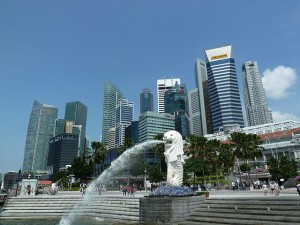 As global economic recovery continues to struggle, the largest business organization in the world called on major economies to open up trade channels further, noting that their efforts to boost trade have been less than impressive.
As global economic recovery continues to struggle, the largest business organization in the world called on major economies to open up trade channels further, noting that their efforts to boost trade have been less than impressive.
The International Chamber of Commerce (ICC) in its latest open markets index said that the Group of Twenty (G20) economies “are failing to demonstrate global leadership on trade openness” despite repeated pledges to bolster trade expansion and job creation.
The “ICC Open Markets Index 2015” shows that G20 nations “rank below the global standard in terms of openness to trade, with only Germany placing among the world’s top 20 open markets.”
The index scores 75 countries on a scale of one to six on four key factors: observed trade openness, trade policy, openness to foreign direct investment, and trade-enabling infrastructure. In doing so, the index also monitors government follow through on long-standing G20 commitments to boost global trade flows, including pledges made at last year’s leaders’ summit in Brisbane, Australia.
It further notes that among global economies, Singapore and Hong Kong are the two most open economies, both with scores of 5.5. They head the 2015 rankings for the third successive edition of the report, far outstripping major economies such as the United States in terms of trade openness.
Thirty-one nations come in after them under the category above average openness, including Luxembourg, Belgium, the Netherlands, Ireland, Switzerland, United Arab Emirates, Iceland, and Sweden. Twenty-six are labeled with average openness, 13 are below average in openness, and three are very weak.
Among countries in the Association of Southeast Asian Nations, Malaysia is ranked 33 (above average openness), Vietnam 45 (average openness), Thailand 47 (average openness), Indonesia 56 (average openness), and Philippines 60 (below average openness).
The latest index reveals that 16 of the G20 economies score only average or below average in terms of overall openness to trade. The two lowest-scoring G20 economies are Brazil and India, though both economies have seen an increase in their score from last year.
The G20 is an international forum for the governments and central bank governors from 20 major economies. The members include 19 individual countries—Argentina (ranked 65, below average), Australia (27, above average), Brazil (70, below average), Canada (24, above average), China (59, average), France (37, average), Germany (19, above average) India (63, below average), Indonesia, Italy (43, average), Japan (44, average), South Korea (41, average), Mexico (54, average), Russia (57, average), Saudi Arabia (36, average), South Africa (50, average), Turkey (51, average), the United Kingdom (30, above average), and the United States (42, average)—along with the European Union (EU).
ICC Secretary General John Danilovich said: “As world leaders look for new engines of growth in the current economic environment, the OMI data shows that there is still substantial scope for G20 leaders to take action to boost global trade. Rolling back protectionism and implementing reforms to facilitate trade flows should be cornerstones of a revitalized G20 agenda to promote renewed growth and stability in the global economy.”
Among other findings, the index also reveals that the European Union is outperforming the United States in terms of trade openness, and only two economies ranked as “excellent” in terms of overall openness, specifically Hong Kong and Singapore.
Moreover, there is an upward trend in “trade policy” scores throughout the Index, but implementing the World Trade Organization’s Trade Facilitation Agreement could provide a significant further boost.
Commenting on the outlook for global trade, Danilovich said: ‘In the past few weeks we have seen data suggesting that trade flows dropped in the second quarter of this year. This is a worrying trend and one that requires urgent international attention.’
Danilovich added: “We are calling on the G20 to commit to a package of reforms to enable trade as a driver of growth jobs and opportunity. That should start with a clear commitment to ratify and implement the WTO’s agreement on trade facilitation before the year is out.”
According to an ICC commissioned study by the Peterson Institute-as part of ICC’s World Trade Agenda initiative-a simple package of trade reforms could generate export gains over the medium term in excess of US$2 trillion, creating some 34 million jobs in the process.
Photo:





